Nadine Yousif - BBC News, Toronto
Fri, September 29, 2023
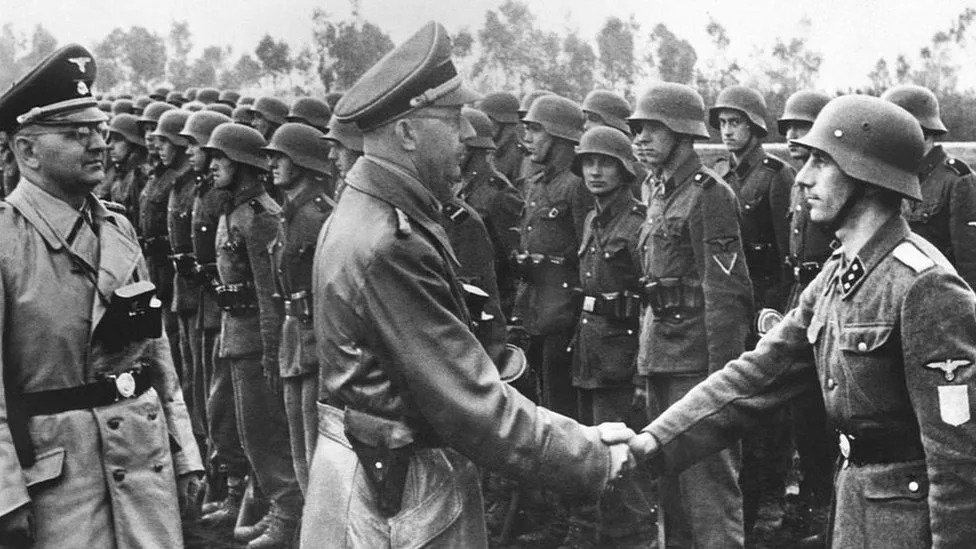
A photo of Heinrich Himmler meeting soldiers in the 14th Waffen Grenadier Division of the SS
When Canada's parliament praised a Ukrainian war veteran who fought with Nazi Germany, a renewed spotlight was put on a controversial part of Ukraine's history and its memorialisation in Canada.
Yaroslav Hunka, the Ukrainian veteran who was applauded in parliament this week, served with a Nazi unit called the 14th Waffen Grenadier Division of the SS - also known as the Galicia Division - that was formed in 1943.
His appearance was criticised by Jewish groups and other parliamentarians alike. MP Anthony Rota, who invited him, has since resigned as the Speaker of the House of Commons, saying he deeply regretted the mistake.
Praise for Nazi veteran 'embarrassing' - Trudeau
But this is not the first time that Ukraine's role in WWII has sparked a debate in Canada, which is home to the largest Ukrainian diaspora outside of Europe.
Several monuments dedicated to Ukrainian WWII veterans who served in the Galicia Division exist across the country. Jewish groups have long denounced these dedications, arguing soldiers in the Galicia Division swore allegiance to Adolf Hitler, and were either complicit in Nazi Germany's crimes or had committed crimes themselves.
But for some Ukrainians, these veterans are viewed as freedom fighters, who only fought alongside the Nazis to resist the Soviets in their quest for an independent Ukraine.
A contentious history
The Galicia Division was a part of the Waffen-SS, a Nazi military unit that on the whole was found to have been involved in numerous atrocities, including the massacring of Jewish civilians.
During the war, more than one million Jews in Ukraine were killed, mostly between 1941 and 1942. Most of them were shot to death near their homes by Nazi Germans and their collaborators.
The Galicia Division has been accused of committing war crimes, but its members have never been found guilty in a court of law.
Jewish groups have condemned Canadian monuments to Ukrainian veterans who fought in the Waffen-SS, saying they are "a glorification and celebration of those who actively participated in Holocaust crimes".
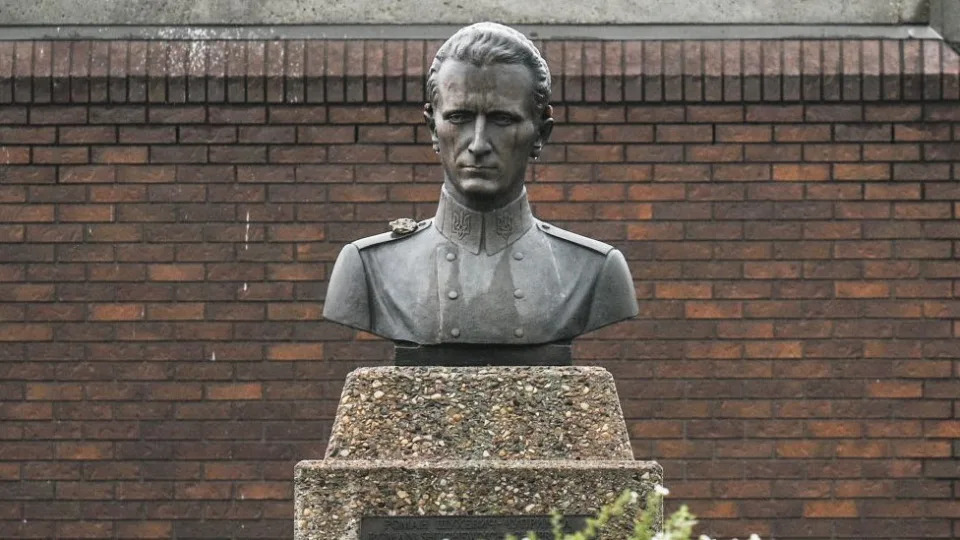
A controversial sculpture of Ukrainian soldier Roman Shukhevych, located near the Ukrainian Youth Association in Edmonton
One such monument sits in a private Ukrainian cemetery in Oakville, Ontario, and features the insignia of the Galicia Division. Another was put up by Ukrainian WWII veterans in Edmonton, Alberta.
A third, also in Edmonton, depicts the bust of Roman Shukhevych, a Ukrainian nationalist leader and Nazi collaborator, whose units are accused of massacring Jews and Poles.
Shukhevych's involvement, however, is a matter of debate and he was not a member of the Galicia Division.
The monuments, which date back to the 1970s and 80s, have all been vandalised in recent years, with the word "Nazi" painted across them in red.
Why is there disagreement on what the monuments stand for?
It goes back to Ukraine's history in the war, as well as the make-up of Canada's large Ukrainian diaspora, said David Marples, a professor of eastern European history at the University of Alberta.
During WWII, millions of Ukrainians served in the Soviet Red Army, but thousands of others fought on the German side under the Galicia Division.
Those who fought with Germany believed it would grant them an independent state free from Soviet rule, Prof Marples said.
At the time, Ukrainians resented the Soviets for their role in the Great Ukrainian Famine of 1932-33, also known as Holodomor, which killed an estimated five million Ukrainians.
Far-right ideologies were also gaining traction in most European countries in the 1930s - including the UK - and Ukraine was no exception, said Prof Marples.
Following the defeat of Germany, some of the Galicia Division soldiers were allowed entry to Canada after surrendering to the Allied forces - a move that was resisted by Jewish groups at the time.
Some Canadians of Ukrainian descent view these soldiers and the broader Galicia Division as "national heroes" who fought for the country's independence.
They also argue that their collaboration with Nazi Germany was short-lived, and that they, including Shukhevych, had eventually fought both the Soviets and the Germans for a free Ukraine.
But the Jewish community views this differently.
"The bottom line is that this unit, the 14th SS unit, were Nazis," B'nai Brith Canada leader Michael Mostyn told the BBC.
Canada has reckoned with this history in the past through a commission in 1985, which was tasked with investigating allegations that Canada had become a haven for Nazi war criminals.
A report released by the commission the following year concluded that there is no evidence tying Ukrainians who fought with Nazi Germany to specific war crimes.
And the "mere membership in the Galicia Division is insufficient to justify prosecution," the report added.
The report's findings have since been contested by Jewish groups and some historians.
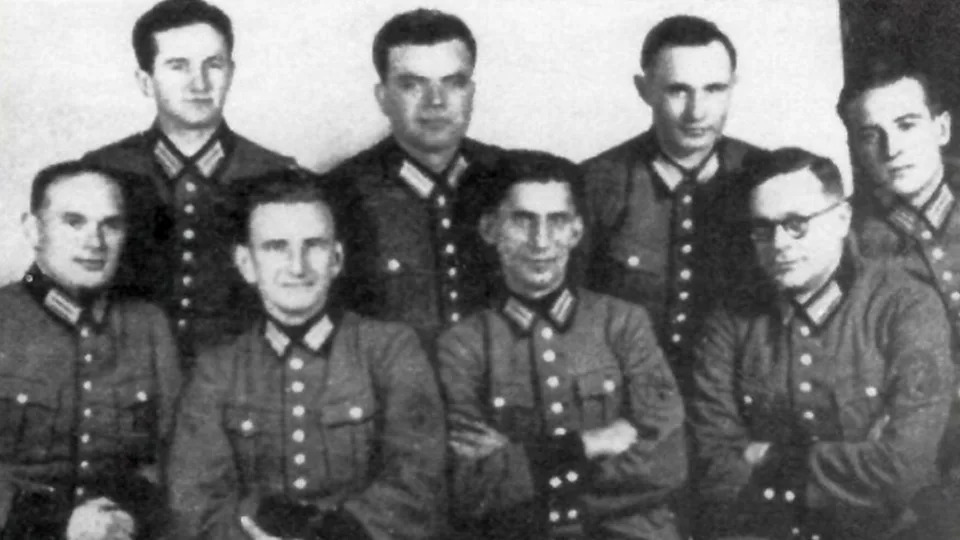
Roman Shukhevych (sitting, second from left) shown in Bataillon 201 in 1942
Prof Marples said that at the time of the report, some WWII archives in Ukraine and Russia were not accessible and have since become public, prompting renewed research on the issue.
It was then revealed through this additional research that some of those who served within the Galicia Division were involved in war crimes, he said, although none were ever convicted.
Russian disinformation targets Ukraine's history
As this historical debate entered the 21st century, it was made more complicated by modern Russian propaganda, which falsely labelled the Ukrainian government as Nazis to justify its invasion of the country.
Prof Marples said that while far-right extremism still exists in Ukraine, it is much smaller than what Russian propaganda tries to make people believe.
And Ukrainian elected officials are not tied to any far-right group in the country.
"Russia has greatly simplified the narrative," Prof Marples said.
Ukrainian groups in Canada say the row over monuments and Mr Hunka's appearance in parliament is the result of this propaganda.
As far back as 2017, before the invasion but when Russia-Ukraine tensions were high, the Russian embassy in Canada criticized the existence of Ukrainian monuments in Canada, accusing them of paying tribute to "Nazi collaborators".
Taras Podilsky, a spokesperson for the Ukrainian Youth Unity Complex in Edmonton that houses the bust of Shukhevych, said Mr Hunka's swift renunciation by Canadian politicians is the latest effect of Russia's disinformation campaign.
He added there is no evidence linking the veteran to war crimes.
"Without any due process, this person is a victim of a Russian narrative that has now been successful," Mr Podilsky said.
Mr Mostyn of B'nai Brith said he acknowledged the complicated nature of this history, especially to some within the Ukrainian diaspora.
But he said any ties to Nazism "is not something that we can allow future generations to celebrate or whitewash".
More broadly, Holocaust scholars have called out several eastern European countries in recent years for downplaying their role in the massacre of Jewish people during WWII.
Both Jewish groups in Canada and Canadians of Ukrainian descent behind these monuments said they have had conversations about the issue.
However, both said they were unable to agree on a path forward.
"It is on our own private property, it is not on public property, and it is for us to have a symbol of Ukrainian freedom," Mr Podilsky said of the Shukhevych bust in Edmonton. "We know there was no wrongdoing."
Mr Mostyn said that, to him, the recent episode in Canada's House of Commons shows that there are gaps when it comes to Canada's knowledge of Nazi history.
"We have a situation in Canada where we don't know our own history when it comes to Nazi perpetrators that made their way into this country," he said.
He and others within the Jewish community in Canada have called for a renewed examination of this history.
"It really is important that leadership be shown at the highest level by our prime minister, to finally open this up, because this is something that Jewish community has been demanding for decades."
‘Canada has a dark history with Nazis’: political scandal prompts reckoning
Leyland Cecco in Toronto
THE GUARDIAN
Fri, September 29, 2023
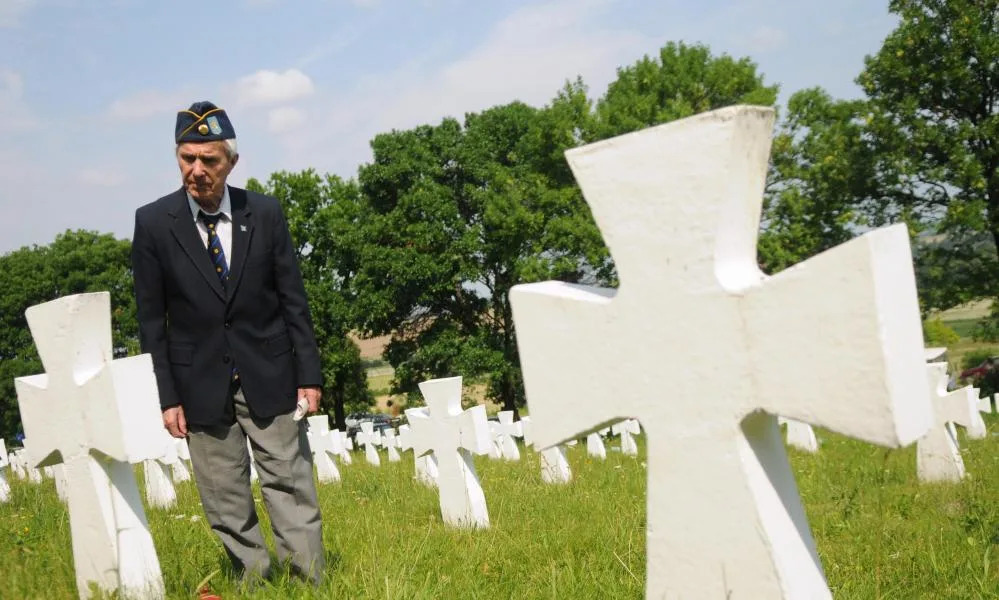
Photograph: AFP/Getty Images
Standing in the House of Commons this week, Canada’s prime minister, Justin Trudeau, apologized after a war veteran who fought alongside the Nazis was invited into the country’s parliament, called a “hero” and celebrated with two standing ovations.
Trudeau said all lawmakers “regret deeply” having stood and clapped – “even though we [did] so unaware of the context”, adding that the event was a disservice to the memory of millions “targeted by the Nazi genocide”.
Related: Canada parliament speaker resigns after calling Ukrainian Nazi veteran a ‘hero’
“Every year there are fewer and fewer Holocaust survivors to share firsthand the horrors of what they experienced,” said Trudeau. “And it is therefore incumbent upon us all to ensure that no one ever forgets what happened.”
But the momentary amnesia – a forgetfulness seemingly shared by all lawmakers who applauded that day – has transformed into a costly political scandal and prompted a broader re-examination of the legacy of Nazi-linked Ukrainian groups in Canada.
During the second world war, Ukraine was one of the main battlefields of the eastern front. About 4.5 million Ukrainians fought in the Red Army; far fewer – approximately 250,000 – aligned themselves with Nazi Germany. Some factions at different times fought both Soviet and German forces; some were involved in the mass killing of Ukrainian Jews.
Yaroslav Hunka, the 98-year-old veteran lauded in Canada’s parliament, was a member of the SS 14th Waffen Division, a volunteer unit also known as the “Galicia Division”.
Towards the end of the second world war, the group was also known as the First Ukrainian Division of the Ukrainian National Army, which in the following years had the effect of obscuring its links to the Nazi regime.
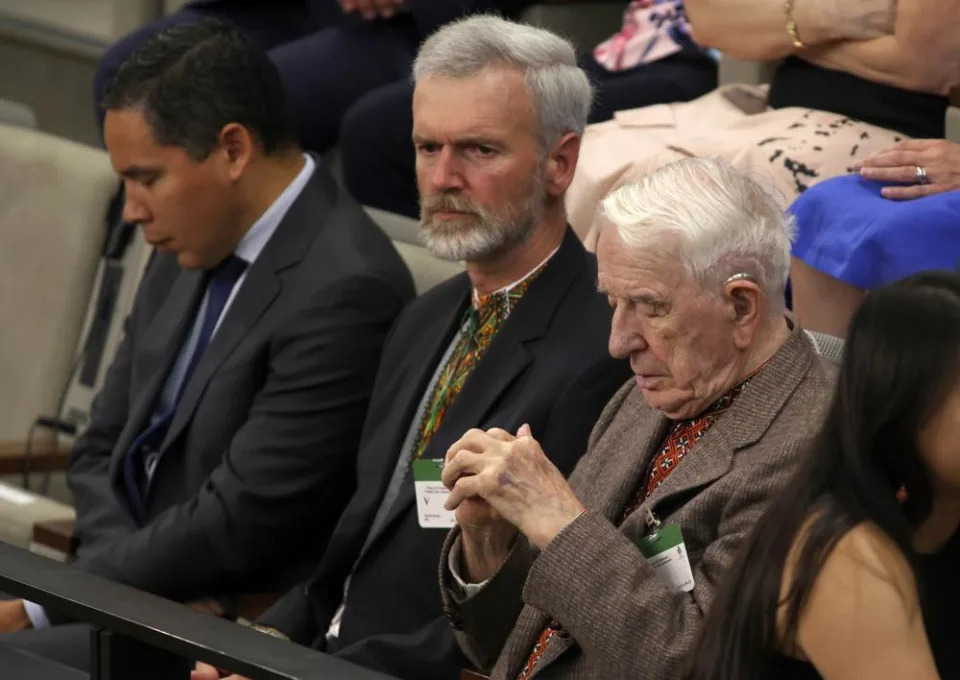
Yaroslav Hunka, the 98-year-old veteran who was lauded in Canada’s parliament. Photograph: Patrick Doyle/AP
After the war, thousands of Ukrainians moved to Canada, and many who had lived through Stalin’s terror and the ensuing mass starvation held strongly anti-Soviet views. But possible links and sympathies to the Nazis were largely overlooked as the cold war set in, said Ivan Katchanovski, a political scientist at the University of Ottawa.
Despite the Galicia Division’s links to war crimes, a cenotaph celebrating the unit was erected in Canada’s largest Ukrainian cemetery. The memorial has long been source of frustration for Polish and Jewish groups. In June 2020 the words “Nazi war monument” were spray-painted on the cenotaph.
“The group, and the memorials to the fighters, have really escaped scrutiny because so few people know the First Ukrainian Division was just a different name for the SS 14th Waffen Division. And this was one of the reasons, unfortunately, why no one raised the issue in the parliament last week,” said Katchanovski.
When he took the stage of Canada’s parliament a week ago, Zelenskiy praised the city of Edmonton for being the first place in the world to erect a commemoration of the Holodomor famine, a deliberate policy from the Soviet Union which killed millions of Ukrainians.
Five miles north, a bust of the Ukrainian military leader Roman Shukhevych atop a stone plinth has long outraged Jewish and Polish groups. Shukhevych, who fought for Ukrainian independence, served with the Nazis and is believed to have been a perpetrator of massacres in Volhynia and eastern Galicia.
Diplomats from Poland and Israel condemned a similar memorial in Ukraine recently, alleging Shukhevych was responsible for the murder of tens of thousands “by bullets, fire, rape, torture and other beastly methods – only because they prayed to God in Polish or Hebrew”.
While many Canadians may have been surprised to learn of statues venerating such figures, these monuments have long been a “painful source of tension” for the Jewish community, said Dan Panneton at the Friends of Simon Wiesenthal Centre.
“I feel like a lot of people are only now learning truly how deep this pain goes. But the reality is, the monuments are on private property. And over the years, we’ve seen a reluctance with specific, nationalistic facets of the community to engage with negative aspects of Nazi collaboration and participation in the Holocaust.”
The row over Hunka’s invitation has also reopened debate over the hundreds of suspected war criminals who settled in the country.
“Canada has a really dark history with Nazis in Canada,” the immigration minister, Marc Miller, told reporters ahead of the prime minister’s apology. “There was a point in our history where it was easier to get [into Canada] as a Nazi than it was as a Jewish person. I think that’s a history we have to reconcile.”
Prominent Jewish groups, including the Friends of Simon Wiesenthal Centre, have called for all records about the admittance of former Nazi soldiers to be made public, including the entirety of a landmark 1986 report on war criminals evading justice within Canada.
The 1985 Commission of Inquiry on War Criminals in Canada, colloquially known as the Deschênes Commission, probed whether the country was a haven for war criminals and Nazi sympathizers. The commission was prompted in part, by reports that the Nazi doctor Josef Mengele had attempted to immigrate to Canada in the early 1960s.
But only redacted portions of the report have been released over the years, omitting an appendix with the names of 240 alleged Nazi war criminals who might be living in Canada.
“Charges of war crimes against members of the Galicia Division have never been substantiated,” said the final report. The federal government has only prosecuted four individuals of war crimes – but none of those attempts have ended in conviction. Due to the secretive nature of the report’s contents, it remains unclear how much the government investigated other individuals suspected of war crimes.
“Remembering the Holocaust means not just remembering the victims,” David Matas of B’nai Brith Canada wrote in a recent editorial. “It means also remembering their murderers.”
Fri, September 29, 2023

Photograph: AFP/Getty Images
Standing in the House of Commons this week, Canada’s prime minister, Justin Trudeau, apologized after a war veteran who fought alongside the Nazis was invited into the country’s parliament, called a “hero” and celebrated with two standing ovations.
Trudeau said all lawmakers “regret deeply” having stood and clapped – “even though we [did] so unaware of the context”, adding that the event was a disservice to the memory of millions “targeted by the Nazi genocide”.
Related: Canada parliament speaker resigns after calling Ukrainian Nazi veteran a ‘hero’
“Every year there are fewer and fewer Holocaust survivors to share firsthand the horrors of what they experienced,” said Trudeau. “And it is therefore incumbent upon us all to ensure that no one ever forgets what happened.”
But the momentary amnesia – a forgetfulness seemingly shared by all lawmakers who applauded that day – has transformed into a costly political scandal and prompted a broader re-examination of the legacy of Nazi-linked Ukrainian groups in Canada.
During the second world war, Ukraine was one of the main battlefields of the eastern front. About 4.5 million Ukrainians fought in the Red Army; far fewer – approximately 250,000 – aligned themselves with Nazi Germany. Some factions at different times fought both Soviet and German forces; some were involved in the mass killing of Ukrainian Jews.
Yaroslav Hunka, the 98-year-old veteran lauded in Canada’s parliament, was a member of the SS 14th Waffen Division, a volunteer unit also known as the “Galicia Division”.
Towards the end of the second world war, the group was also known as the First Ukrainian Division of the Ukrainian National Army, which in the following years had the effect of obscuring its links to the Nazi regime.

Yaroslav Hunka, the 98-year-old veteran who was lauded in Canada’s parliament. Photograph: Patrick Doyle/AP
After the war, thousands of Ukrainians moved to Canada, and many who had lived through Stalin’s terror and the ensuing mass starvation held strongly anti-Soviet views. But possible links and sympathies to the Nazis were largely overlooked as the cold war set in, said Ivan Katchanovski, a political scientist at the University of Ottawa.
Despite the Galicia Division’s links to war crimes, a cenotaph celebrating the unit was erected in Canada’s largest Ukrainian cemetery. The memorial has long been source of frustration for Polish and Jewish groups. In June 2020 the words “Nazi war monument” were spray-painted on the cenotaph.
“The group, and the memorials to the fighters, have really escaped scrutiny because so few people know the First Ukrainian Division was just a different name for the SS 14th Waffen Division. And this was one of the reasons, unfortunately, why no one raised the issue in the parliament last week,” said Katchanovski.
When he took the stage of Canada’s parliament a week ago, Zelenskiy praised the city of Edmonton for being the first place in the world to erect a commemoration of the Holodomor famine, a deliberate policy from the Soviet Union which killed millions of Ukrainians.
Five miles north, a bust of the Ukrainian military leader Roman Shukhevych atop a stone plinth has long outraged Jewish and Polish groups. Shukhevych, who fought for Ukrainian independence, served with the Nazis and is believed to have been a perpetrator of massacres in Volhynia and eastern Galicia.
Diplomats from Poland and Israel condemned a similar memorial in Ukraine recently, alleging Shukhevych was responsible for the murder of tens of thousands “by bullets, fire, rape, torture and other beastly methods – only because they prayed to God in Polish or Hebrew”.
While many Canadians may have been surprised to learn of statues venerating such figures, these monuments have long been a “painful source of tension” for the Jewish community, said Dan Panneton at the Friends of Simon Wiesenthal Centre.
“I feel like a lot of people are only now learning truly how deep this pain goes. But the reality is, the monuments are on private property. And over the years, we’ve seen a reluctance with specific, nationalistic facets of the community to engage with negative aspects of Nazi collaboration and participation in the Holocaust.”
The row over Hunka’s invitation has also reopened debate over the hundreds of suspected war criminals who settled in the country.
“Canada has a really dark history with Nazis in Canada,” the immigration minister, Marc Miller, told reporters ahead of the prime minister’s apology. “There was a point in our history where it was easier to get [into Canada] as a Nazi than it was as a Jewish person. I think that’s a history we have to reconcile.”
Prominent Jewish groups, including the Friends of Simon Wiesenthal Centre, have called for all records about the admittance of former Nazi soldiers to be made public, including the entirety of a landmark 1986 report on war criminals evading justice within Canada.
The 1985 Commission of Inquiry on War Criminals in Canada, colloquially known as the Deschênes Commission, probed whether the country was a haven for war criminals and Nazi sympathizers. The commission was prompted in part, by reports that the Nazi doctor Josef Mengele had attempted to immigrate to Canada in the early 1960s.
But only redacted portions of the report have been released over the years, omitting an appendix with the names of 240 alleged Nazi war criminals who might be living in Canada.
“Charges of war crimes against members of the Galicia Division have never been substantiated,” said the final report. The federal government has only prosecuted four individuals of war crimes – but none of those attempts have ended in conviction. Due to the secretive nature of the report’s contents, it remains unclear how much the government investigated other individuals suspected of war crimes.
“Remembering the Holocaust means not just remembering the victims,” David Matas of B’nai Brith Canada wrote in a recent editorial. “It means also remembering their murderers.”
The scandal over a standing ovation for a Nazi veteran is now raising questions about a cemetery monument in Canada that honors his Waffen SS unit
Matthew Loh
Fri, September 29, 2023 at 2:24 AM MDT·3 min read
107
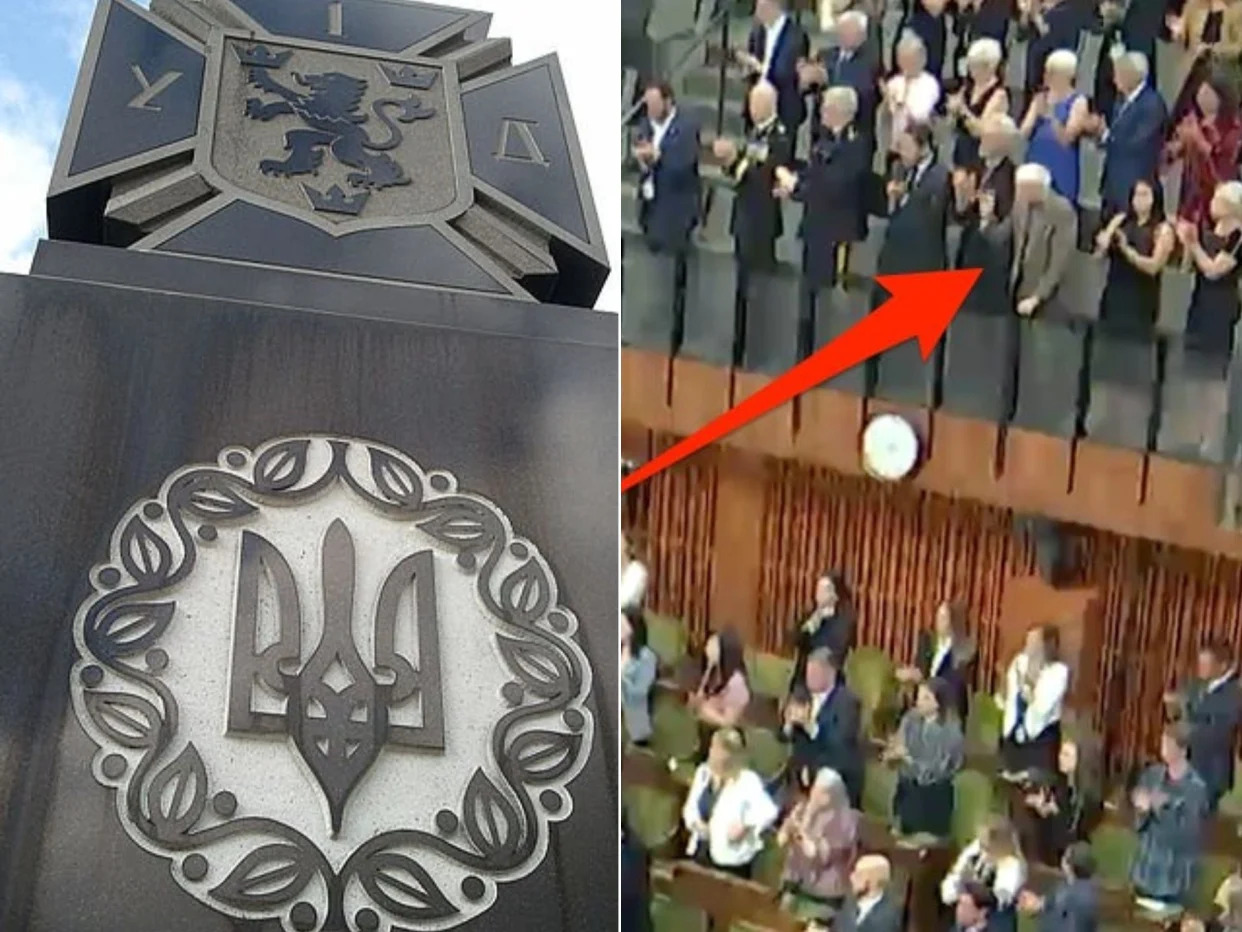
The scandal over a standing ovation for a Nazi veteran is now raising questions about a cemetery monument in Canada that honors his Waffen SS unit
Canada's parliament accidentally applauded a 98-year-old Nazi veteran on Friday.
The gaffe rekindled calls for a monument honoring his unit to be removed from a Canadian cemetery.
Yaroslav Hunka served in the 14th Waffen SS Division, a voluntary unit of mostly Ukrainians.
The Canadian parliament's standing ovation for a Ukrainian war veteran who turned out to be a former fighter for Nazi Germany has reignited calls to take down a monument honoring his unit.
Yaroslav Hunka, 98, who served in the voluntary 14th Grenadier Division of the Waffen SS, was applauded as a war hero by Canadian leaders on Friday without them realizing he actually fought in a Nazi unit.
Prime Minister Justin Trudeau has since apologized for the gaffe, calling it "deeply embarrassing." Ukrainian President Volodymyr Zelenskyy was visiting Canada's parliament at the time of the standing ovation.
Now a monument honoring Hunka's unit in Oakville's St Volodymyr Ukrainian Cemetery is under fire again after his appearance made headlines.
"It's unacceptable to have monuments dedicated to a unit affiliated with the SS because they were complicit in the Holocaust," Dan Panneton, director of allyship and community engagement from the Friends of Simon Wiesenthal Center for Holocaust Studies, told the Canadian media outlet Global News.
The monument, located around 25 miles from Toronto, is a centograph that was erected in remembrance of those who fought for the 14th SS Division, also known as the Galicia Division.
It was vandalized with graffiti in 2020, when someone spray-painted the words "Nazi war monument" on its face, reported The Ottawa Citizen.
The monument was one of several brought up by the Russian Embassy in Ottawa in 2017, which complained that the structures honored "Nazi collaborators in Canada and nobody is doing anything about it."
These monuments in Canada have been controversial. Jewish groups like B'nai Brith Canada are lobbying to have them removed, calling them "Nazi-glorifying monuments."
But some Ukrainians who moved to Canada believe those who joined the Galicia Division were doing so because they thought they were fighting to free their country from Soviet rule, David Marples, professor of Eastern European history at the University of Alberta, told the BBC.
Jewish groups in Canada disagree. "The bottom line is that this unit, the 14th SS unit, were Nazis," B'nai Brith Canada leader Michael Mostyn told the outlet.
Marples noted that modern Russia has seized upon the narrative of some Ukrainian allyship with Nazi Germany to incorrectly say that modern Ukraine is now run by Nazis. "Russia has greatly simplified the narrative," Marples said, per the BBC.
The Galicia Division, of which Hunka was a part of, has been accused of committing war crimes, including the slaughter of hundreds of Polish civilians. Its members have not been convicted in court, though records continue to surface of the slaughter.
It was a voluntary unit formed in 1943 by Nazi Germany and mainly consisted of men of Ukrainian or Slovak descent.
Meanwhile, a Polish minister said on Tuesday that he has "taken steps" to extradite Hunka from Canada and to prosecute him in Poland.
No comments:
Post a Comment